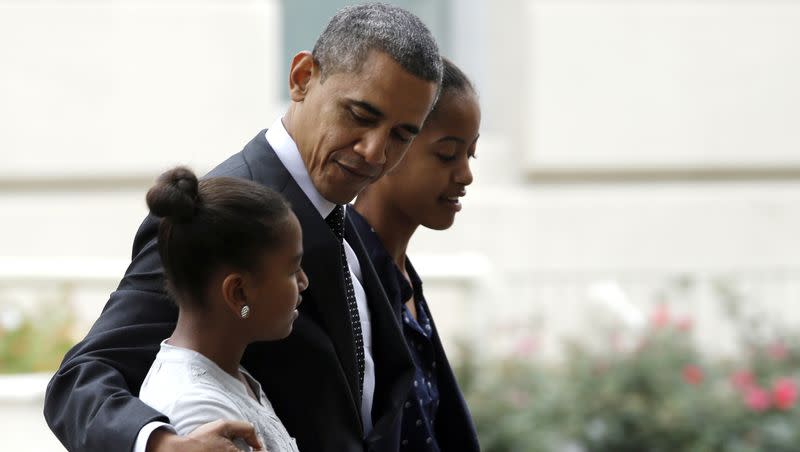How many teens have the same politics as their parents?

This article was first published in the State of Faith newsletter. Sign up to receive the newsletter in your inbox each Monday night.
Teenagers may ignore their parents’ reminders about chores and homework, but most seem to be good at absorbing what they hear about politics and faith.
A new analysis from Pew Research Center found that a large majority of teens espouse the same political and religious views as their parents, even in households where the parents haven’t prioritized passing on these views.
Here are some of Pew’s specific findings:
82% of Protestant parents have a teen who identifies as Protestant.
81% of Catholic parents have a teen who identifies as Catholic.
86% of religiously unaffiliated parents have a teen who is also religiously unaffiliated.
81% of parents who identify as Republicans or lean toward the Republican Party have a teen who identifies as Republican.
89% of parents who identify as Democrats or lean toward the Democratic Party have a teen who identifies as a Democrat.
Pew noted that the consistency of results from faith group to faith group and from political party to political party was surprising, given that some groups prioritize passing on their beliefs more than others.
For example, 70% of white evangelical parents reported that it was “extremely or very important” to them to pass on their religious beliefs to their kids, compared to just 8% of religiously unaffiliated parents. But the share of teens with evangelical parents who identify as evangelical (80%) is actually lower than the share of teens with religiously unaffiliated parents who identify as religious unaffiliated (86%).
Pew also pointed out that few parents care as much about passing on their politics as they do about passing on their faith.
“In a fall survey by the center, 35% of U.S. parents said it was extremely or very important that their kids grow up to share their religious views, while fewer than half as many (16%) said the same about their political views,” the new analysis said.
Overall, Pew’s findings make it seem as if passing on your political or religious views is somewhat foolproof, which can be comforting to parents who are struggling with other aspects of raising teens.
But, unfortunately for those parents, the new analysis noted that the survey results won’t necessarily hold steady, since young people’s views on life’s biggest questions often shift during their late teens and early twenties.
“Many people switch religious affiliations or leave organized religion entirely between the ages of 18 and 29,” Pew reported.
Fresh off the press
Do faith groups have a legal right to feed the hungry?
Choosing pets over parenting? Pope Francis is (still) unhappy with you
A late pastor’s grandson sold his watch on eBay. The buyer gave it back — along with a lesson
154 soccer fans were arrested last week for singing antisemitic chants
Term of the week: Vesak
Vesak is a Buddhist holiday commemorating the Buddha’s life, as well as his enlightenment. It’s celebrated with visits to the temple and family gatherings, according to the BBC.
“Families may decorate their homes with lanterns, take part in processions and wear special white clothes to mark the occasion,” the article said, noting that festivities differ depending on where you are in the world.
In 2021, the Biden administration became the first presidential administration in history to host a Vesak celebration. It held its third such gathering on May 5.
“While previous iterations of the White House Vesak ceremony were kept small due to pandemic restrictions, this year participants (included) an array of ambassadors and representatives from the embassies of Cambodia, India, Indonesia, Mongolia, Nepal, Sri Lanka and Thailand,” Religion News Service reported.
What I’m reading ...
The rise of artificial intelligence is already reshaping our academic and professional lives. Soon, it will also affect how we socialize, writes Daniel Cox in a recent edition of his American Storylines newsletter. “The most valuable relationships are those that motivate us to become better. Relationships (with AI chatbots) that do not require empathy and understanding rob us of the very things that make them so important,” Cox writes.
Rabbi Shmuly Yanklowitz is a vegan rabbi on a mission. Over the next year, he plans to visit five to 10 synagogues across the U.S. and take part in debates about whether or not Jews should eat meat. “Nobody could argue that the Torah forbids meat. But I want to make the case for a higher ethic that emerges from Torah,” he told The Forward during an interview about his plan.
A new report from LifeWay Research highlights the conversations happening in U.S. congregations about foster care and adoption. “Around 1 in 6 say their church leaders have raised funds for families who were adopting (18%), encouraged families to provide foster care (17%) or encouraged families to consider adoption (16%). Additionally, 10% say their church leaders have provided training for foster parents in the last year,” the report said.
Odds and ends
I can’t stop thinking about this whacky coronation-related story from The Washington Post: “I was not Meghan in disguise at coronation, says 79-year-old composer.”

